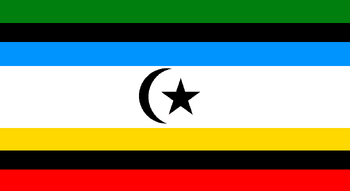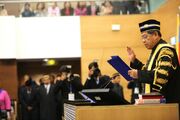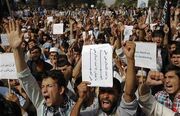
Proposed flag for ARMP
The Autonomous Region in Muslim Phaluhm (Otomnous Rehyion sa Muslim Phaluhm, منطقة الحكم الذاتي في پءلۇحم مسلم) is a proposed autonomous region in Phaluhm Phoueck. It was drafted byMuslim Party MPAbrah Leymes, which will allow the Muslim majority islands of Kambular and Magazena to have greater autonomy which all of the power is currently held in Dauham Sammar Hazaham, where Atheists, Christians, Muslims and Buddhists make up the majority. The region capital will be in Kota Kambular. A greater plan which included Southern Nazahezan, Dauham Sammar Hazaham and Javahezam which are also Muslim majority places, has been considered but scraped due to more stable governance and little public interest there.
It is currently supported Kambularan and Prime Minister Royna Nehgyen, Liberal National Party,Labour Party, various tribes, Peace for Phaluhm, Ministry of Muslim Affairs and sultan in exile, Yenah Kaliybatan. It is opposed by the Conservative Party, Independence Party, New Hamalisim Party, anti federalism\autonomy parties\individuals, Islamic Front and Dalauah Islamiyah.
History[]
For the most parts of Phaluhm's History, the region have been dominated by the Phoueck tribe, which have been mostly Muslim. The region has been the traditional homeland of Muslims, even before the arrival of the Spanish. In the 14th century, the tribes (except Nallek, which was influenced by the Chinese) united and formed the Phaluhm Phoueck sultanate. The Spanish colonised Phaluhm during the 1500s and Christianisation occured in Phaluhm during that time. Muslims, who felt that they were slaves through Spanish, American and British rule continued to raid and fight the colonisers to restore the Phaluhm sultanate. During the 1800s, Muslims in British Phaluhm began a peace deal and recognised Muslim rights around the area.
During sultanate years, the Muslims were peaceful due to the fact that a Muslim majority government was at power, but due to progressive protesters, anti monarchs and Atheists, Christians and Buddhist rights movements, the 1979 Phaluhm Revolution occured andKhem Hamal was in power. Khem Hamal thought that religion was holding the country behind, and he coordinated the Tohezeck Hotel Raid, after confirming that there was going to be a coup d'etait attempt to bring power back to the sultan in 1980. With esculating tensions between the government and the Muslim rebels, an all out war occured with the Muslim rebels and extremists to challenge the government, even after his disposal in 1995.
In 1997, the Phaluhm maddasal collapsed, and it could not keep on funding the leased tribal areas of Phaluhm, the tribes staged an uprising, but was quickly suppressed by government forces. In 2004, Muslim Party, Abrah Leymes proposed that autonomous regions should be created in Kambular and Magazena to give greater autonomy and management to the region, rather than the government, which is more focused on Northern Phaluhm rather than the south.
Blocking by Parliament[]

Dajes Maryens the house speaker of Parliament has repeatedly blocked the creation of the region
Repeatedly, the Parliament has blocked such attempts, in the fear of destabalising the country and calling up ethnic and religious tensions and allowing more religiously active and extremists in to government. Most of the public according to a recent PTV survey found that "MP's don't want the establishment of an autonomous region, in the grounds of losing public money by corrupt government officials". Corruption is widespread around Phaluhm. The current President of Phaluhm, Hassanal Padukam has opposed the making of an Autonomous Region due to instablity and the readiness of the Southern Phaluhm people. He has also faced a corruption scandal in 2016, which outraged the public.
Public support[]
Support is very little in government, but the whole Liberal National Party and Kambularan Royna Nehgyen, supports the region, calling it "the only solution" and "as a Kambularan myself, I understand the struggle and dificulties of the Muslim people and tribes in Phaluhm". The group, Peace for Phaluhm repeatedly said that "autonomous regions are the absolute essential for secure governance and peace in Phaluhm".
Public support is relativaly high. 83% supported an autonomous region in Southern Phaluhm according to a PTV survey in 2016.
Leymes v. Parliament of Phaluhm Phoueck[]

Anti government protests outside Parliament House in 2011, supporting Leymes
On 16 January, 2011 Leymes demanded a case with the Parliament of Phaluhm Phoueck as there was indications that MP's were paied by political parties, buisnesspeople and other organisations\individuals, to block the bill due to fear of losing money as they would have to pay additional region tax if they live in the region. Leymes lost the case, in the grounds that there was no substantial evidence that claimed they were being bribed.
Comparisons[]
| Body | ARMP | San Sabyleo | Phaluhm Phoueck |
|---|---|---|---|
| Constitutional Document | Basic Law for the Autonomous Region in Muslim Phaluhm | San Sabyleon Basic Law | Constitution of Phaluhm Phoueck |
| Head of State | Governor\Sultan (proposed) | Arch Duke | President |
| Head of Government | Prime Minister of ARMP | Governor | Prime Minister of Phaluhm Phoueck |
| Executive | Executive Department of ARMP | National Executive Department | |
| Legislative | Local Parliament of ARMP | Parliament of Phaluhm Phoueck | |
| Parliament of Phaluhm Phoueck (national) | |||
| Police | Phaluhm National Police | ||
| Military | Armed Forces of Phaluhm Phoueck | ||
| Currency | Phaluhm Maddasal | ||
| Official Languages | Phaluhm, English, Malay and Arabic | Phaluhm, English and Spanish | Phaluhm and English |
| Foreign relations | None | Full Rights | |
| Shariah Law | Yes, for Muslims only (ordinances exists inKota Kambular, Westal City, Nuevert, Klas Bay, Maryenta, Rembal,Puerto Jesalan and Mahazam) | None, secular law only | |
See Also[]
- National Liberation Movement
- Phouecka
- Phaluhm Muslim Crisis peace progress
- Phaluhm Muslim Crisis
- Parliamentary Reform Group
